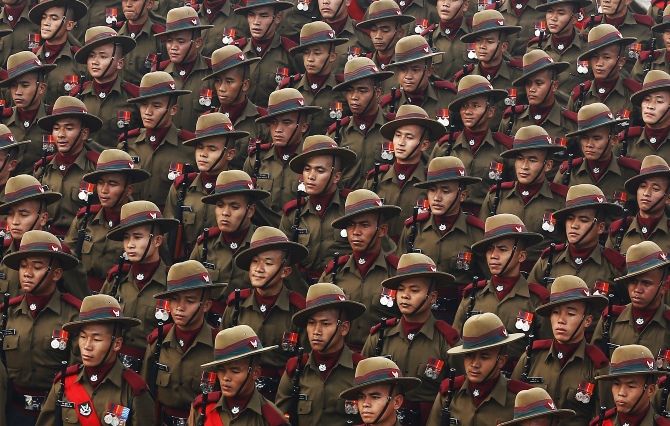Over the past two decades, six of the eight army chiefs have been from the infantry and the other two from the artillery division.
The appointment of either General Bakshi or General Hariz would interrupt the infantry's prolonged domination of the army command, says Ajai Shukla, a retired army officer himself.

An inevitable controversy has erupted after the government's announcement of Lieutenant General Bipin Rawat as the general who will succeed General Dalbir Singh Suhag on December 31 to the post of Chief of the Army Staff (COAS), or army chief.
Opposition parties have accused the government of politicising the appointment by abandoning the traditional criterion of seniority.
More worryingly, there is sharp resentment within sections of the army on the sidelining of two high-calibre officers who General Rawat will supersede -- Lieutenant General Praveen Bakshi, currently commanding the Eastern Army in Kolkata, the senior-most after General Suhag, and Lieutenant General P M Hariz, also senior to General Rawat, who commands the Southern Army from his headquarters in Pune.
Officers from the infantry are defending the superession of Generals Bakshi and Hariz, the former from the armoured corps, and the latter from the mechanised infantry.
Over the past two decades, six of the eight army chiefs have been from the infantry and the other two from the artillery division.
The appointment of either General Bakshi or General Hariz would interrupt the infantry's prolonged domination of the army command -- which comes with the right to make appointments and shape promotion policy.
The elevation of General Rawat, like General Suhag an infantryman from the Gorkha Rifles, preserves this arrangement.
However, even infantry officers are alarmed at how General Suhag has packed army headquarters with fellow Gorkha Regiment officers.
Besides General Rawat, Gorkha officers occupy the key posts of Director General of Military Operations (Lieutenant General A K Bhatt); Director General of Military Intelligence (Lieutenant General S K Patyal); Director General of Military Training (Lieutenant General A L Chavan); Adjutant General (Lieutenant General Rakesh Sharma); and Director General Staff Duties (Lieutenant General Vijay Singh), among many others.
General Rawat's supersession of General Bakshi and General Hariz indicates how difficult it has become for a non-infantry general to become chief, even when he has the seniority and merits.
The army's command hierarchy has demonstrated its ability to bring the government around to their viewpoint.
The government, however, justifies General Rawat's selection as based on merit. In leaks to chosen journalists on WhatsApp (which this correspondent has reviewed) a defence ministry spokesperson claimed General Rawat's rare combination of skill and experience makes him 'the best suited among the lieutenant generals, to deal with the emerging challenges...'
Separately, the defence ministry spokesperson has told journalists over the phone that General Bakshi, a tank man who has spent many years in the deserts of Rajasthan and in Punjab, was ill equipped to handle the internal security challenges of Jammu & Kashmir and the northeast.
General Bakshi's tenures as chief of staff at the Northern Command and at the Eastern Army command apparently count for nothing.
Nor apparently does the fact that war with Pakistan would centre on swift tank offensives under the 'Cold Start' doctrine.
"The army believes peacetime operations are more important than preparing for a real war," says a senior serving general.
Without question, the government has the right to appoint an army chief of its choice.
In an army where seniority has often elevated the wrong general to the top job, a move to meritocratic selection must be unambiguously welcomed.
"Though it is good to have a meritocracy, there must be clear criteria for determining merit. Otherwise, generals will start approaching politicians who can promote them to the top, and that will end the apolitical character of the army," warns Lieutenant General H S Panag (retd), a former army commander.
While General Bakshi, General Hariz and General Rawat are all capable of leading the army successfully, there are no objective criteria to suggest General Rawat is any more meritorious than the officers he superseded.
General Bakshi, particularly, has distinguished himself from his cadet days, performing outstandingly over decades. He is enormously respected by subordinates and peers for his integrity and blunt forthrightness, both valuable military qualities.
"When I heard about Bipin Rawat's appointment as the next chief, I immediately assumed that Praveen Bakshi -- who I know enjoys an excellent reputation -- was being named the first tri-service chief. That might still happen, but the government should have first announced Bakshi's elevation," says Lieutenant General Rustom Nanavatty, a revered former army commander who happens to be from the Gorkha Rifles.
That an unusual succession might be coming became evident in September, when the chief cut short General Rawat's tenure at the head of the Southern Command, and appointed him vice-chief -- a placement usually given to chiefs-in-waiting to acquaint them with army headquarters functioning before they take over the army.
Then came the inexplicable delay in announcing General Suhag's successor, traditionally done two or three months before the outgoing chief retires. Eventually, the announcement came only two weeks before General Suhag was due to retire.
Since Independence, successive governments have appointed army chiefs based on the principle of seniority.
The one exception was the appointment of General Arun S Vaidya as army chief in 1983, superseding Lieutenant General S K Sinha, who the Indira Gandhi government considered dangerously political.
Earlier, in 1975, when Indira Gandhi had reservations over appointing the strong-willed and forthright Lieutenant General Prem Bhagat as army chief, for which he would have been in line when General G G Bewoor retired, the government granted General Bewoor an extension to continue until General Bhagat retired.
As a result of this subterfuge, General Bhagat (who won the Victoria Cross in World War II) never had to be superseded.












 © 2025
© 2025